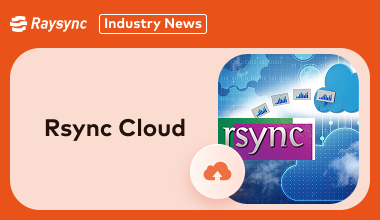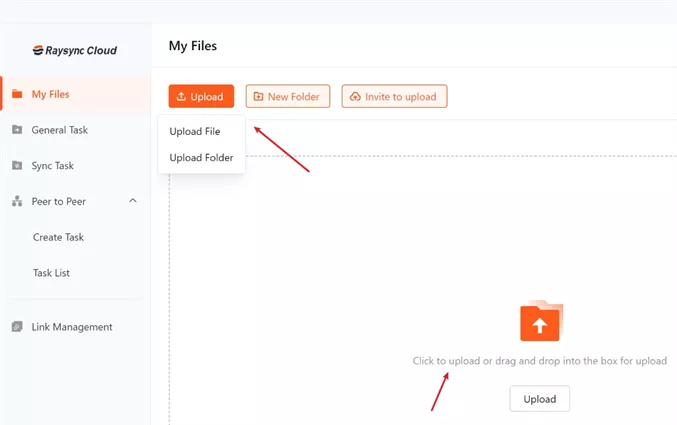Everything about Rsync Cloud in 2025
February 20, 2025Cloud storage and syncing are essential these days, and efficiency is key. Rsync Cloud combines the power of the classic Rsync tool with modern cloud capabilities. It's popular because it only transfers file changes, saving bandwidth and speeding up syncing, and it works with major platforms like AWS, Google Drive, and Dropbox.
However, it can be tricky to set up and might involve extra costs. So, is Rsync Cloud the best option for businesses in 2025? This post explores its features, pricing, and pros, comparing it to alternatives like Raysync Cloud, to help you find the perfect cloud file synchronization tool for your needs. Let's dive into everything you need to know about Rsync Cloud in 2025!

What Is Rsync Cloud
Rsync Cloud refers to the use of the Rsync utility in conjunction with cloud storage services. Essentially, it allows you to leverage Rsync's efficient file transfer and synchronization capabilities with the scalability and accessibility of cloud storage.
Here's a breakdown of what that means:
- Rsync: A powerful command-line tool that excels at transferring and synchronizing files and directories. It's known for its delta transfer algorithm, which means it only copies the changes within files, rather than the entire file, saving bandwidth and time.
- Cloud Storage: Services like AWS S3, Google Cloud Storage, Dropbox, etc., that provide online storage for your data.
How Rsync Cloud works:
- Rsync Cloud typically involves using the Rsync tool to transfer files to and from a cloud storage service. This can be done through various methods, such as:
- Direct integration: Some cloud providers offer direct integration with Rsync, allowing you to use Rsync commands to interact with their storage.
- Third-party tools: There are tools and services that act as a bridge between Rsync and cloud storage, enabling you to use Rsync with various cloud platforms.
Is Rsync Cloud Free
Rsync itself is open-source and free to use.
However, when integrated with cloud services, users might incur costs depending on their Rsync Cloud storage provider. Services like AWS, Google Drive, or Dropbox charge for storage space and data transfer.
Additionally, tools that simplify Rsync Cloud’s integration, like Rclone, may offer free features but also include premium plans for advanced capabilities. So while Rsync is technically free, leveraging it for Rsync Cloud backups often involves additional costs.
Advantages of Using Rsync Cloud
Rsync Cloud, the combination of the Rsync utility with cloud storage services, offers several key advantages:
- Efficiency through Delta Transfers: Rsync's most significant advantage is its delta transfer algorithm. Instead of copying entire files, it only transfers the changes within files. This drastically reduces bandwidth usage, especially when dealing with large files that are frequently updated. This translates to faster synchronization and backups, and lower data transfer costs.
- Cost-Effectiveness: Reduced bandwidth usage directly leads to lower cloud storage costs, especially for pay-as-you-go cloud storage plans. By minimizing the amount of data transferred, you can save money on storage and transfer fees.
- Flexibility and Control: Rsync is a command-line tool with a wide range of options and configurations. This gives you fine-grained control over your file transfers and synchronization processes. You can customize the behavior of Rsync to suit your specific needs.
- Security: Rsync supports secure transfers over SSH, ensuring that your data is encrypted during transit. This is crucial for protecting sensitive information.
- Automation: Rsync can be easily scripted and automated, making it ideal for scheduled backups and synchronization tasks. This allows you to automate your data management processes and ensure that your data is always up-to-date.
- Platform Compatibility: Rsync is available for various operating systems (Linux, macOS, Windows), providing flexibility and allowing you to use it across different platforms.
- Version Control (with some configurations): While not inherent, Rsync can be configured to maintain multiple versions of files, allowing you to revert to previous versions if needed. This adds a layer of data protection.
- Direct Integration with Some Cloud Providers: Some cloud providers offer direct integration with Rsync, simplifying the process of using Rsync with their storage services.
Rsync Cloud Alternative for Business - Raysync Cloud
Raysync Cloud is an advanced, enterprise-grade solution designed to optimize secure, high-speed file synchronization and transfer. While Rsync Cloud is powerful, it often requires complex configurations and technical expertise. Raysync Cloud, on the other hand, offers a seamless, business-friendly alternative with a user-friendly interface and robust data management capabilities.
Built for large-scale enterprise needs, Raysync Cloud efficiently handles massive data volumes without compromising speed or security. It utilizes intelligent bandwidth optimization, ensuring up to 99% network utilization for faster transfers.
Unlike Rsync Cloud, which relies on command-line configurations, Raysync Cloud simplifies file management with an intuitive dashboard, real-time monitoring, and automated workflows. It supports cross-platform integration, allowing businesses to sync files across various cloud environments effortlessly.

Let’s look at the pros and cons of Raysync Cloud:
Pros:
- Lightning-fast transfer speeds.
- User-friendly interface.
- High-level encryption for secure data transfer.
- Enterprise-grade support and scalability.
- Real-time sync with minimal setup.
Con:
- You will need a paid license to try its outstanding features.
Pricing Model: Raysync Cloud offers subscription-based pricing:
|
Raysync Cloud |
|
|
Cost |
$99/ Month |
|
Service |
Cloud |
|
UDP Bandwidth |
1Gbps |
|
Storage Capacity |
1 TB |
FAQS about Rsync Cloud
Curious about Rsync Cloud? Here are answers to common questions about its functionality, differences from similar tools, and whether it’s still a top choice in 2025:
1. Is Rsync a Cloud Storage?
No, Rsync is not a cloud storage service. It is a file synchronization tool that can be used to transfer files to and from cloud storage providers. When paired with tools like Rclone, Rsync facilitates seamless integration with services like Google Drive and AWS, but it doesn’t offer storage itself.
2. What is the Difference Between Rsync and Grsync?
Rsync is a command-line utility, while Grsync is a graphical user interface (GUI) for Rsync. Grsync simplifies Rsync’s usage by providing a visual interface, making it accessible to users unfamiliar with command-line operations. While Grsync inherits Rsync’s functionality, it lacks some advanced scripting capabilities.
3. Is Rclone Better Than Rsync?
Rclone and Rsync are both excellent tools, but they serve different purposes. Rclone is specifically designed for cloud storage integration, supporting a wide range of providers natively. Rsync, on the other hand, is better for local backups and incremental file syncing.
The End
Rsync Cloud is great for techies, but its complexity and costs can be a hurdle. Businesses needing something easier and faster should check out Raysync Cloud. It offers simple cloud file transfers, top-notch security, and blazing speeds. Ready for an upgrade? Try Raysync Cloud today!
You might also like
![In-Depth Review of Auto FTP Manager [2025 Updated]](http://images.ctfassets.net/iz0mtfla8bmk/3Y3T4POouY5SN4yn7rFOUQ/24a95ff57277e2db0ba7a8650f4aaa46/auto-ftp-manager.png)
Industry news
December 25, 2024Discover the advanced features of Auto FTP Manager. Automate, secure and optimize file transfers effortlessly. Updated for 2025!

Industry news
August 2, 2024Discover the top 5 FTP replacements to improve your file-sharing speed and security.

Industry news
September 27, 2024Safeguard your business data with the best cloud backup options. Discover how Raysync, Veeam, Carbonite, and IDrive can protect your valuable information and ensure business continuity.